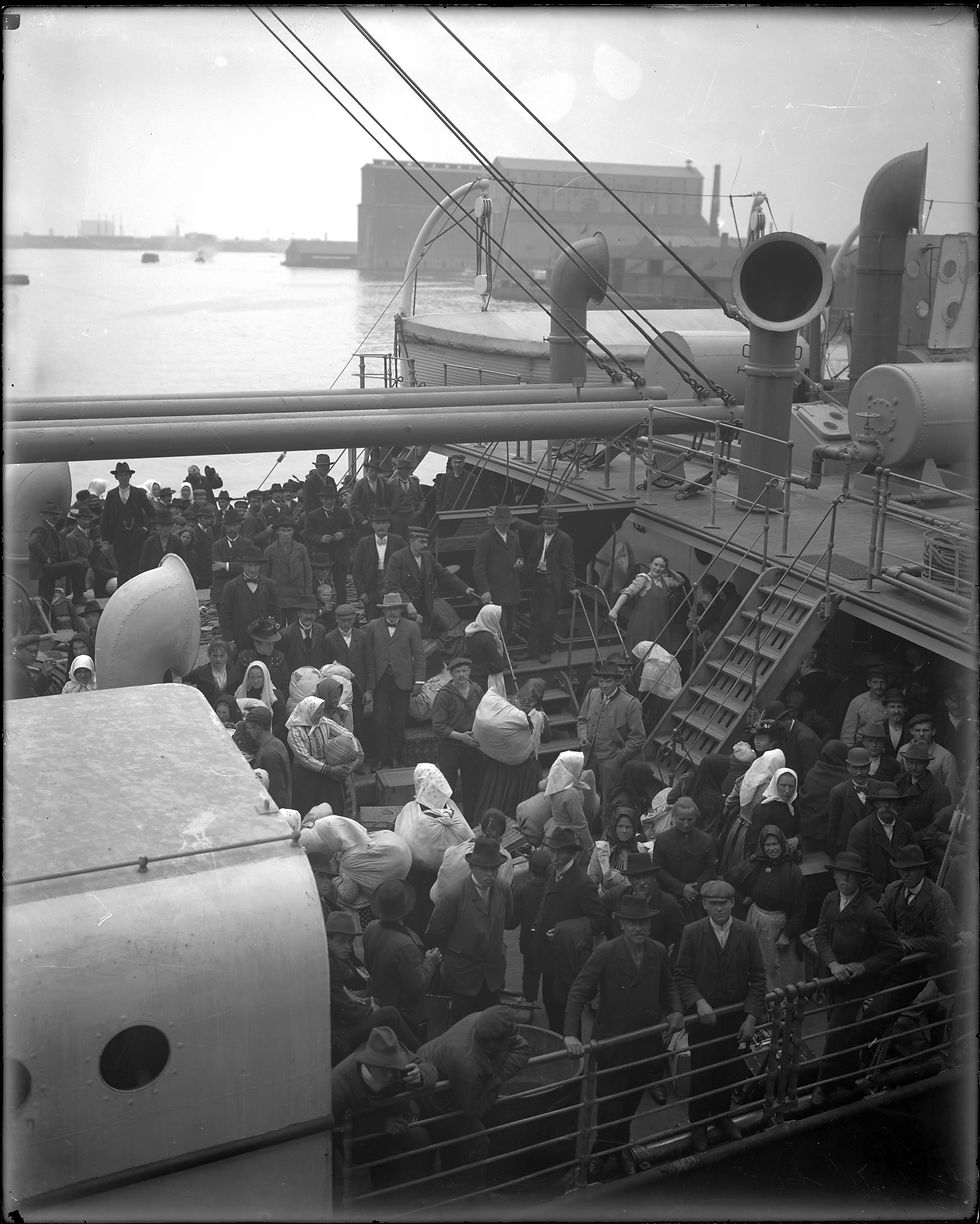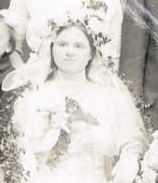Arrival Day in the USA
- Tara
- Aug 9, 2025
- 7 min read
Reflecting on My Ancestors Challenging Immigration Journeys from the Old Country

A benefit to gathering all the documents in my Hungarian citizenship journey has been getting to know the exact dates my ancestors arrived in the United States.
It's cool to know I am starting to write this post on the 112th anniversary of my great-grandmother, Anna, stepping off the boat and setting foot in Philadelphia.
Since becoming a citizen of the Old Country, through my great-grandmother, I like to celebrate the anniversary of her arrival in the US. After all, her bravery changed my destiny.
My Ancestors' Experience
I have always wondered what my ancestors were thinking as they travelled to the US, especially since, as a child, I often heard the story that Anna travelled with just one suitcase. (I think it was a gentle reminder to me to be happy for my abundance of clothing, especially as a grumpy teenager with "nothing to wear.")
I was also told that all my great-grandparents, like millions of other immigrants, voyaged to the US in steerage class -- the cheapest form of ocean travel.
(The reason it's called steerage is debated by many (see here) but there is agreement that this form of travel was very difficult.)
Steerage class accommodation was usually below the main deck, without much space or privacy. And I've also been told that my ancestors who travelled this way recounted stories of everyone in steerage being seasick!
I wished I had asked for more details while they were still living. But now I have to rely on archival accounts and vague memories to get an idea of what they endured.
The book, Hunky, is a fascinating read about immigrant journeys. It inspired me to do my own research, and find out more about the experience of female passengers in steerage, as I know that my great-grandmother travelled with just another female friend.
I'll never know exactly how her journey went, but while looking for "steerage conditions in early 1900's" " I came across two documents with similar reporting. They make for painful reading.
Take care of yourself if you choose to read these in detail. The descriptions of conditions in steerage class, and the treatment of women is appalling. Furthermore, some who wrote these accounts describe our beloved ancestors in offensive and vile ways.
I'm not a historian, so please make your own conclusions. But personally, I was saddened by all I read.

One bit of hope I have is that my great-grandmother Anna, though in steerage, travelled on the SS Neckar with one of the largest and most respected German steamship companies- the Norddeutscher Lloyd. According to all the reports I read, the larger German lines did tend to take better care of steerage passengers - especially women. So I hope very much that was her experience.
However, most people crossing the Atlantic around the time my great-grandmothers and great-grandfathers did, suffered all manner of injustice and indignity.
One document I read is the 1911 Report to Congress on Steerage Conditions by the Immigration Commission. This report, compiled by Republican Senator William P. Dillingham, provides detailed accounts of the harsh conditions faced by steerage passengers. The Commission employed undercover agents to travel in steerage class, posing as immigrants, to gather their information.
Overall the report is critical of the steamship companies and their crew, for creating abhorrent conditions for passengers travelling in steerage, noting:
"...the persons carried are looked upon as so much freight, with mere transportation as their only due."
At least one of the agents who contributed to the report was a woman, and travelled undercover as a steerage class passenger. Her accounts are terrifying and heartbreaking. She reported:
"Some of the crew were always on deck, and took all manner of liberties with the women, in broad daylight as well as after dark. Not one young woman in the steerage escaped attack. The writer herself was no exception."
In many ways this report seems like a step in the right direction. It suggested stricter regulations for steamships transporting immigrants to the US:
"There is no reason why the disgusting and demoralizing conditions which have generally prevailed in the steerages of immigrant ships should continue."
My great-grandmother travelled after this report was published, and again, on a large German line, so I pray that her voyage was not so dangerous. But I'll never be sure. Which is one reason I take time to remember her "arrival day" each year.
Damage from the Full Dillingham Report
While the Dillingham Report on Steerage Conditions generally places blame on the steamship companies for the conditions in steerage, this was just part of a bigger project.
The overall 41-volume Dillingham Report on Immigration, also published in 1911 led to faulty conclusions and recommendations based in bias. You can read the full report here. Or for a quicker view, the Smithsonian magazine article about it.
In short, it seems the Dillingham report made a fundamental error (now actually called the Dillingham Flaw ) by using simplistic categorization of groups of people, and assigning value to "old" and "new" immigrants, without taking into consideration the time immigrants had to assimilate into the US.
Our Old Country ancestors from Eastern Europe were considered "new" immigrants and as such, mostly undesirable.
Yes, our grandparents and great-grandparents were determined by this government commission to add "less value" to the United States than earlier English, Irish and other immigrants. The report suggested literacy tests for immigrants and led to an overall negative opinion of "new" immigrants among the general American public.
A first-class snob gets involved
And then, we have Ernest C. Cotterill, who, according to the New York Times, was a businessman in Philadelphia. He took it upon himself to research steerage conditions on ships travelling from Europe to the US. He told the newspaper all about it.
This article was published in November of 1913, after my great-grandmother had arrived in the US, so there is a chance he could have been her shipmate during one his research trips.
This account is almost less painful to read than the Dillingham Report, because the elitism, classism and racism are so blatant that it's almost comical. I say almost, because it's hard to laugh at what this first class snob says.
Ernie, it seems, was very concerned about what he saw in the steerage sections of the ships.
The cost of ocean travel had gone up in price, he noted, and so people who used to be able to afford 2nd class travel, now had to buy steerage tickets.
And Ernie, you see, was very concerned that educated, fine mannered people now had to actually see and be around steerage class passengers.
To be fair, he was also very worried about emigrees being swindled in card games on the ship. He also noted that women in steerage were as risk in many ways, on cross-Atlantic journeys. (Though he did spend some time blaming women for flirting with men on board.)
But his real bugbear, you see, was people who ate without a fork and knife.
This really got him clutching his pearls.
No matter that nearly half of the world's population eat with their hands to this day. And billions more use other non-Western utensils. So actually, eating with a fork and knife is still not the norm, worldwide.
But don't tell that to Ernie Cotterill who was so incensed at seeing people eat without forks, that he proposed steamships create a 4th class ticket for "eaters with their hands."
Yes, this was actually published in an article in The New York Times:
Those who feed like animals should be herded by themselves. In my report I have classified these people as 'eaters with their hands.' They are common among the Poles, Russians, Hungarians, and, as I have said, among the natives of the Balkan States.
He goes on, using dehumanizing language, calling "a large proportion of steerage class passengers" including those from "Far Eastern Europe": "barbaric"; "human animals" ; "semi-savages" and "human beasts." He said that current steerage passengers are infecting the "better class" of travellers:
"While they are traveling to the United States, children of comparatively careful European homes are compelled to the companionship of semi-savages, are forced at the common table to watch such spectacles of gluttony and animalism.... That the more decent and developed traveler, even though he or she be traveling in a steerage, should be compelled to such associations, is deplorable.
He went on to criticize the charities in the US that help immigrants, and the state of immigration in general:
...we are definitely and intentionally made the dumping ground for immoral characters from practically every part of Europe....Undoubtedly we are getting a considerable quantity of very definitely bad citizenship material.
He was talking about my Old Country ancestors and their neighbors, who turned out to be pretty darn good citizenship material in my opinion.
They did jobs like mining, cleaning, steelwork and farming - difficult jobs that they gave their life to while also raising families, adding to the economy, building communities and giving back to the United States. But they were called "semi-savages" , "human animals" and "bad citizenship material."
Does this sound familiar?
So today, on the anniversary of my great-grandmother's arrival in the United States, I am thinking of her and her perhaps arduous journey. I hope that she did not endure some of the things I read about in the Dillingham Report. I thank her for having the courage to change her destiny and mine.

And finally, today, in honor of all the immigrants who travelled in steerage class, and for those who take difficult journeys to the US today, with hopes and dreams for their future, today, I will eat with my hands.
I will use thick bread to sop up paprika-filled fish soup, and I will not care, ever, if some snobs, who never had to work outside, or in a mine, or as a housekeeper, or even buy groceries -- think I am beneath them for doing so.
"



Comments